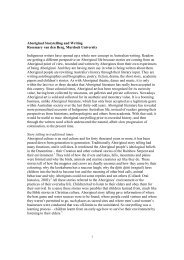Gallipoli, Kokoda and the Making of National Identity - [API] Network
Gallipoli, Kokoda and the Making of National Identity - [API] Network
Gallipoli, Kokoda and the Making of National Identity - [API] Network
Create successful ePaper yourself
Turn your PDF publications into a flip-book with our unique Google optimized e-Paper software.
The <strong>Making</strong> <strong>of</strong> <strong>National</strong> <strong>Identity</strong><br />
When Keating tried to suggest what it was that Australians had fought to defend<br />
at <strong>Kokoda</strong> he used vague statements: ‘<strong>the</strong> democracy <strong>the</strong>y had built’ or <strong>the</strong> even<br />
more elusive claims about <strong>the</strong> ‘spiritual basis’ <strong>and</strong> <strong>the</strong> ‘soul’ <strong>of</strong> <strong>the</strong> nation. 27 When<br />
John Howard recently wrote <strong>of</strong> <strong>the</strong> ‘great Australian dream’ he defined it as:<br />
employment <strong>and</strong> home ownership, reward for hard work <strong>and</strong> risk taking, <strong>the</strong> realistic<br />
hope <strong>of</strong> self-advancement <strong>and</strong> <strong>the</strong> realistic hope <strong>of</strong> achieving security for one’s<br />
family within <strong>the</strong> context <strong>of</strong> a strong, cohesive community. 28 It’s a limp dream, not<br />
one likely to inspire <strong>the</strong> men on F Force at Shimo Sonkurai on <strong>the</strong> Burma-Thail<strong>and</strong><br />
Railway at <strong>the</strong> height <strong>of</strong> <strong>the</strong> wet season in 1943.<br />
Perhaps it is desirable to be imprecise. Precision may force division. It is critically<br />
important for a multicultural Australia to be confident that what Australians hold in<br />
common is both powerful <strong>and</strong> a force to make a better Australia. Australians seem<br />
keen to find a cohesion in <strong>the</strong>ir past; to adopt a common learnt memory; to become<br />
a part <strong>of</strong> <strong>the</strong> history <strong>of</strong> <strong>the</strong> people <strong>and</strong> <strong>the</strong> place that <strong>the</strong>y now belong to — although<br />
<strong>the</strong>y may trace <strong>the</strong>ir family histories into o<strong>the</strong>r communal <strong>and</strong> national histories.<br />
They or <strong>the</strong>ir imagined national forbears were <strong>the</strong>re when Jedda jumped, Marjorie<br />
Jackson dropped <strong>the</strong> baton, Ben Chifley saw <strong>the</strong> light on <strong>the</strong> hill, Mrs Petrov got <strong>of</strong>f<br />
<strong>the</strong> plane in Darwin; <strong>and</strong> Daisy Bates married Breaker Marinate; <strong>and</strong> <strong>the</strong>y sparred<br />
with Les Darcey, put money on Fine Cotton, tunnelled on <strong>the</strong> Snowy, stood with<br />
Gough on <strong>the</strong> steps <strong>of</strong> parliament house on 11 November, shared a taxi with Bee<br />
Miles, found Azaria’s matinee jacket, saw <strong>the</strong> shark cough up <strong>the</strong> arm, <strong>and</strong> swam in<br />
<strong>the</strong> Moree pool with Charlie Perkins. Where <strong>the</strong> cohesive force in a multicultural<br />
state is a presumption <strong>of</strong> a shared past <strong>the</strong>n it seems all that much more necessary<br />
for Australians to scrutinise <strong>the</strong>ir formal <strong>and</strong> informal history: it helps determine<br />
who we might be as much as who we think we were.<br />
Through <strong>the</strong> fiftieth anniversary celebrations <strong>of</strong> <strong>the</strong> second world war, <strong>the</strong><br />
campaign to streng<strong>the</strong>n ties with Asia, <strong>the</strong> Mabo debate <strong>and</strong> assertions about<br />
multiculturalism John Howard complained about a rewriting <strong>of</strong> history that denigrated<br />
<strong>the</strong> British <strong>and</strong> marginalised ‘mainstream’ Australians. Since taking over as prime<br />
minister he has been more specific. He has said, ‘I sympathise fundamentally with<br />
Australians who are insulted when <strong>the</strong>y are told that we have a racist bigoted past,<br />
<strong>and</strong> some Australians are told that regularly’. He thought Australians rejected <strong>the</strong><br />
idea that it was necessary to tell children whose parents had no part in discriminatory<br />
action against Aborigines about a racist past. 29 In <strong>the</strong> contest for <strong>the</strong> history to be<br />
held in common, Howard wanted no Australians to think that <strong>the</strong>y were <strong>the</strong>re at<br />
Myall Creek or rode with <strong>the</strong> police at Coniston or joined <strong>the</strong> miners to harry <strong>the</strong><br />
Chinese at Buckl<strong>and</strong> River. In <strong>the</strong>ir public claims about <strong>the</strong> history that Australians<br />
should learn two successive prime ministers have confirmed <strong>the</strong> power that lies in<br />
perceptions <strong>of</strong> <strong>the</strong> past. The debate about what is remembered <strong>and</strong> what is celebrated<br />
is a debate about <strong>the</strong> future.<br />
Endnotes<br />
A shortened version <strong>of</strong> this paper was first given at a seminar on nationalism in <strong>the</strong> Humanities<br />
Research Centre, Australian <strong>National</strong> University, in February 1996. I referred to some <strong>of</strong> <strong>the</strong><br />
complexities <strong>of</strong> anzac day in Port Moresby in <strong>the</strong> Dalton lecture, James Cook University, 1993.<br />
159


![Gallipoli, Kokoda and the Making of National Identity - [API] Network](https://img.yumpu.com/31766380/12/500x640/gallipoli-kokoda-and-the-making-of-national-identity-api-network.jpg)
![Dream and Nightmare in William Gibson's ... - [API] Network](https://img.yumpu.com/49298598/1/184x260/dream-and-nightmare-in-william-gibsons-api-network.jpg?quality=85)

!['Fuck All Editors': The Ern Malley Affair and Gwen ... - [API] Network](https://img.yumpu.com/42446228/1/184x260/fuck-all-editors-the-ern-malley-affair-and-gwen-api-network.jpg?quality=85)
![Polona Petek - [API] Network](https://img.yumpu.com/40542952/1/190x245/polona-petek-api-network.jpg?quality=85)
![to download as a PDF. - [API] Network](https://img.yumpu.com/35170825/1/184x260/to-download-as-a-pdf-api-network.jpg?quality=85)
![Edward Koiki Mabo: The Journey to Native Title - [API] Network](https://img.yumpu.com/33197148/1/184x260/edward-koiki-mabo-the-journey-to-native-title-api-network.jpg?quality=85)
![Indigenous Knowledge and Pharmaceuticals - [API] Network](https://img.yumpu.com/24108846/1/184x260/indigenous-knowledge-and-pharmaceuticals-api-network.jpg?quality=85)
![Ferals: Terra-ism and Radical Ecologism in Australia - [API] Network](https://img.yumpu.com/13809010/1/184x260/ferals-terra-ism-and-radical-ecologism-in-australia-api-network.jpg?quality=85)
![Big Chief Little Wolf: Wrestling, Radio and Folklore in ... - [API] Network](https://img.yumpu.com/12204748/1/184x260/big-chief-little-wolf-wrestling-radio-and-folklore-in-api-network.jpg?quality=85)
![Dark Tourism and the Celebrity Prisoner - [API] Network](https://img.yumpu.com/4348795/1/184x260/dark-tourism-and-the-celebrity-prisoner-api-network.jpg?quality=85)